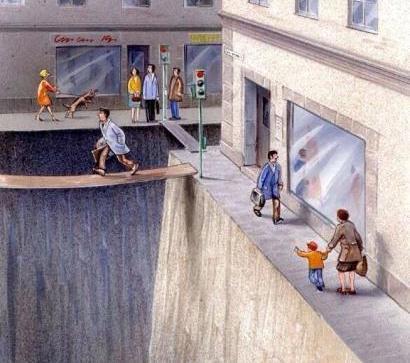Wander into your average American coffee shop, and you won’t see a sedan ordering a latte. So why are the owners of diners often forced to devote the majority of the land upon which their business sits to the storage of privately owned vehicles, rather than cafe tables and kitchen space?
A classic chart from Graphing Parking went newly viral on Twitter this week, but it illustrates the persistent paradox of restaurant parking minimums. Most cafe owners don’t get into the food industry to lay asphalt, but city ordinances often require them to build a minimum number of parking stalls that varies based on the square footage of their building. Austin, for instance, requires restaurants under 2,500 square feet to build one spot for every 75 square feet of building area. When you take into account that the average parking space takes up a staggering 180 square feet, it’s no wonder that a typical American restaurant has more SUVs in the lot than appetizers on the menu.
The problem with that jumbo lot, of course, is that it represents valuable land that could be devoted to far better things — and not just a few extra burners on the cooking line. Sometimes it represents a sorely needed affordable apartment building that was never built. Or an office building that would make it possible for a worker in that neighborhood to commute on foot rather than schlepping to an office park on the edge of town. Or it might just represent a few thousand square feet of pavement that an overworked chef-owner doesn’t have to spend his or her money and time to maintain — money which can be devoted to, say, the actual work of running a restaurant rather than tending to pavement.
And that beleaguered chef isn’t the only one who would benefit from devoting less of our private land to cars.
Another classic image from Graphing Parking shows one of the worst offenders in the parking lot wars: worship spaces. According to Graphing Parking, the average church, mosque or temple devoted a whopping 29 square feet of real estate to parking for every six square feet of actual worship space in 2014, a number that’s unlikely to have budged much. Given that most of those lots are only used on days of worship — and even then, might still have lots of space —so much parking seems even more egregious.
Perhaps the only place where cars eat up more city space is on the roadway itself. Back in 2014, Copenhagenize brilliantly illustrated the near-total dominance of the automobile in a single Paris intersection, in three images:
And that’s on a posh European street with a generous pedestrian plaza and some pretty dreamy piano key crosswalks. Imagine performing this exercise on the eight-lane state highway astride your neighborhood strip mall.
Of course, no roundup of graphics that illustrate the incalculable stupidity of the amount of space we devote to cars would be complete without this classic poster from way back in the 1960s from a London public transit organization:
Cars aren't only horrible because they take up too much public space. They're also dangerous, which inspired this visual poem about what it's like to be a pedestrian in an American city.
Let's hope 2020 is the year when graphics like these finally fall out of date.






